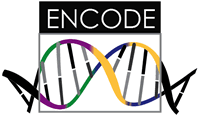Last updated: March 09, 2012
2011 News Feature Encode Rfas Expand Effort To Understand The Genome
ENCODE RFAs Expand Effort to Understand the Genome
By Geoff Spencer
Associate Communications Director for Extramural Research
 The National Institutes of Health's genome institute launched the Encyclopedia of DNA Elements, or ENCODE, project in 2003 to identify all the functional parts of the human genome, from protein-encoding genes to the regulatory elements that turn genes on and off.
The National Institutes of Health's genome institute launched the Encyclopedia of DNA Elements, or ENCODE, project in 2003 to identify all the functional parts of the human genome, from protein-encoding genes to the regulatory elements that turn genes on and off.
On Tuesday, October 4, 2011, the institute released three new Requests for Applications (RFAs) in which it announced plans to invest more than $120 million over four years (or about $31.5 million in FY 2012) to expand ENCODE research. These RFAs will extend these resources towards as complete a catalogs as is feasible employing state-of-the-art technologies; will continue to make the data rapidly accessible to the research community; and will support the analysis of ENCODE data.
Eight years ago, ENCODE started with a pilot project focused on 1 percent of the genome. In 2007, the ENCODE project was expanded to analysis of the entire human genome, and the modENCODE project was formed to identify all the functional parts of the fruit fly and worm genomes. The ENCODE projects create catalogs of functional elements to help researchers understand how genomes work and provide community resources that have been used by the researchers throughout the world to produce remarkable insights into genome function.
With the publication of NHGRI's strategic plan in early 2011, the institute recognized the compelling need to continue to generate comprehensive catalogs of genomic data for understanding the biology of genomes as well as their importance in to the study of medical conditions, both common and rare diseases. The ENCODE catalog, for example, provides an important resource that researchers have begun to use to understand the genetic foundations of disease, such as by combining ENCODE data with results from Genome Wide Association Studies (GWAS) that identify genetic variants associated with traits and diseases.
"ENCODE will help inform researchers about basic biology and will give new insights into disease, especially since so many disease-associated genetic variants fall outside of the genes," said Elise Feingold, Ph.D., program director for ENCODE projects. "The more we annotate the genome, the more we have a chance to understand and identify causative variants and how they contribute to health or disease."
The newly released RFAs fall into three categories:
- Expanding the Encyclopedia of DNA Elements (ENCODE) in the Human and Model Organisms (U54)
- Using high-throughput laboratory methods, this project seeks to expand the maps in a larger number of cells and tissues of several types of genomic activity, including: all classes of functional RNA molecules; open chromatin; DNA methylation; and transcription factor binding sites, among many others.
- NHGRI intends to commit $23 million in total costs in FY 2012 to fund six to eight awards.
- Letter of Intent Deadline: November 6, 2011
- Application Deadline: December 6, 2011
- Computational Analysis of the Encyclopedia of DNA Elements (ENCODE) Data (U01)
- Researchers will be funded to develop new analytical methods to improve data analysis of ENCODE data and make it more useful in the study of disease.
- NHGRI intends to commit $3 million in total costs in FY 2012 to fund five to eight awards.
- Letter of Intent Deadline: November 6, 2011
- Application Deadline: December 6, 2011
- Data Analysis and Coordination Center for the Encyclopedia of DNA Elements (ENCODE) (U41)
- This RFA will establish a ENCODE data coordination and analysis center. The data coordination component will facilitate data management in the project along with creating an ENCODE Portal for dissemination of the data. The data analysis component will perform integrated data analysis of ENCODE data, making it easier any researcher to use, including those studying specific diseases.
- NHGRI intends to commit $5.5 million in total costs in FY 2012 to fund two awards, one for each type of center.
- Letter of Intent Deadline: November 21, 2011
- Application Deadline: December 21, 2011
NHGRI encourages inquiries concerning these funding opportunities and welcomes the opportunity to answer questions from potential applicants. NHGRI will offer a teleconference information session for these RFAs on noon to 3 p.m. EDT on Oct. 31, 2011. To obtain logistical information for the teleconference, researchers should send an e-mail to encode@mail.nih.gov.
Last Reviewed: March 9, 2012
